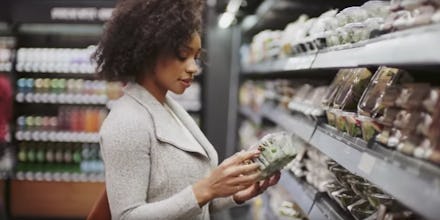Amazon Go's "just walk out" technology sounds like a headache for shoppers of color

Amazon, the internet retailer eager to put drones in your skies and holiday deals in your inbox, now brings us Amazon Go. The physical store, which will open next year in Seattle, lets customers purchase goods by literally taking the item off the shelf and leaving the store — a system called "just walk out." (The item is automatically charged to your Amazon account.) If or when that trend trickles down to traditional retailers, it'll cut the time of shopping in half.
Amazon Go looks like this:
If time is money, Amazon just made everyone a fortune. But the frustration it could cause shoppers of color has the potential to erase that value, as many people on Twitter pointed out.
Racial profiling is a major problem for retailers.
Minority shoppers know this feeling all too well: A store employee singling us out, continually checking on us, issuing warnings. Store managers operate under the false assumption that people of color are more likely to steal. It's an effort known as "loss prevention," but it looks and acts like racial profiling.
Which is why a store like Amazon Go is exciting, yet unnerving.
"In a world where even Oprah has been profiled for walking around a store, there are lots of people who might not want to risk trusting a store to treat them fairly," tech CEO Anil Dash said in an email.
The stats reveal why. The tale of the black person being unfairly watched and followed while shopping is not new. And it's still around. In a 2013 study by the Pew Research Center, 44% of blacks reported unfair treatment in stores compared to just 16% of whites — even though the FBI's data on shoplifting and race suggests far more white people are arrested for larceny, which includes shoplifting. Unfair treatment can turn deadly for black shoppers like William Chapman, a teen killed by police in 2015 after he was accused of shoplifting at a Walmart in Virginia.
White people who have never been "randomly" followed around at a Walgreens may have no problem walking into a store, grabbing an item and leaving — like this guy in the Amazon Go promo video.
But shoppers of color, who already see enough unwanted attention, may have their doubts. Especially in a store where the employees are mostly there for customer service, as Amazon's promo video suggests. They roam the store, stock shelves and hang out near shoppers.
"The danger isn't just being stopped," Dash said, "but more the low-level desire to not be potentially hassled even if it's easily resolved."
Amazon Go is a beautiful system for a perfect world.
Silicon Valley's utopian ideas have a tendency to include unintentional bias — if only because employees of tech companies don't often properly represent the variety of their customers.
Amazon's bold idea for the retailer of the future isn't entirely new. Apple Stores, for example, allow you to purchase on the app and then take your item off the shelf and leave. But as Dash notes, even the Apple Store can make some buyers hesitant. "Potential embarrassment alone stops many people," he said. (In 2015, a woman named Christine Wisne sued Apple Inc. for racial discrimination; similar complaints have followed.)
The difference with Amazon's version is that it uses cameras and deep learning to keep track of what you pick up and put back. Meaning you can grab and go without buying on the app first, and the orange-shirted Amazon employees hovering around won't hassle you.
The Amazon store will also be filled with cameras that enable Amazon's artificial intelligence to recognize the faces of those lifting items. But we know cameras have failed people of color in the past, and more recently, AI has failed us too. (So has surveillance data meant to keep us and our communities safe.)
It's too early to call foul on Amazon, a retailer known for its aggressive experimentation: The store hasn't opened yet, and the company will have plenty of time to add anti-bias practices to its employee training.
Few can say for sure what Seattle residents will experience. Though we'll be anxious to find out when Amazon Go opens its doors to the public in 2017.